Skin conditions are serious and can affect many areas of a person’s life including self-esteem. Participating in one of our Dermatology Clinical Trials can help improve our understanding of the causes and treatment of skin diseases improving patient outcomes.
Dermatology Studies
Our Dermatology Clinical Trials include patients from all backgrounds and ethnicities. This enables us to conduct studies that can lead to improved treatment of dermatologic and other diseases in a diverse group of people.
Female Androgenetic Alopecia
Androgenetic alopecia in women, or female pattern hair loss (FPHL), is a common type of non-scarring hair loss. It causes overall thinning on the scalp while often keeping the frontal hairline intact. Our female androgenetic alopecia clinical trials are investigating a study drug for AGA in women. Women aged 18–65 can join an AGA clinical trial in Boston and Needham and contribute to research that may support future treatments and improve hair loss care.
18 Years to 65 Years
Recruiting
Boston
Female
01
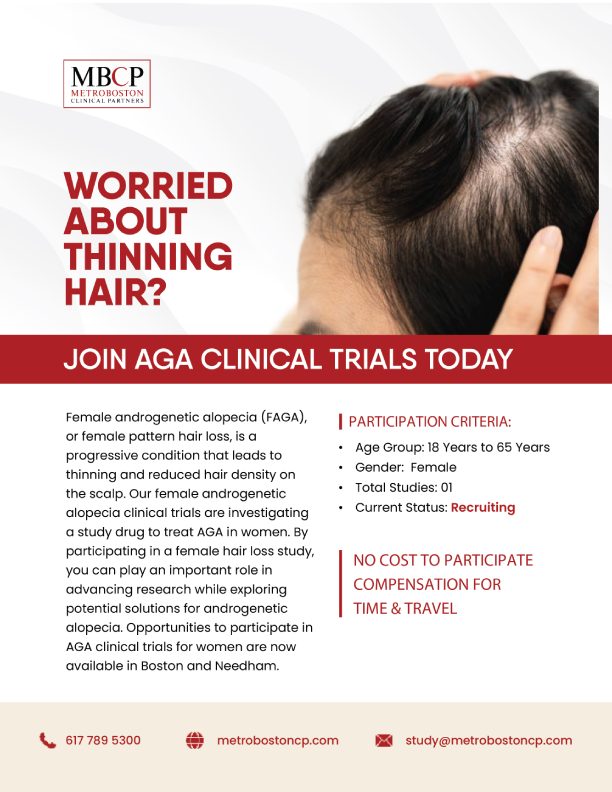
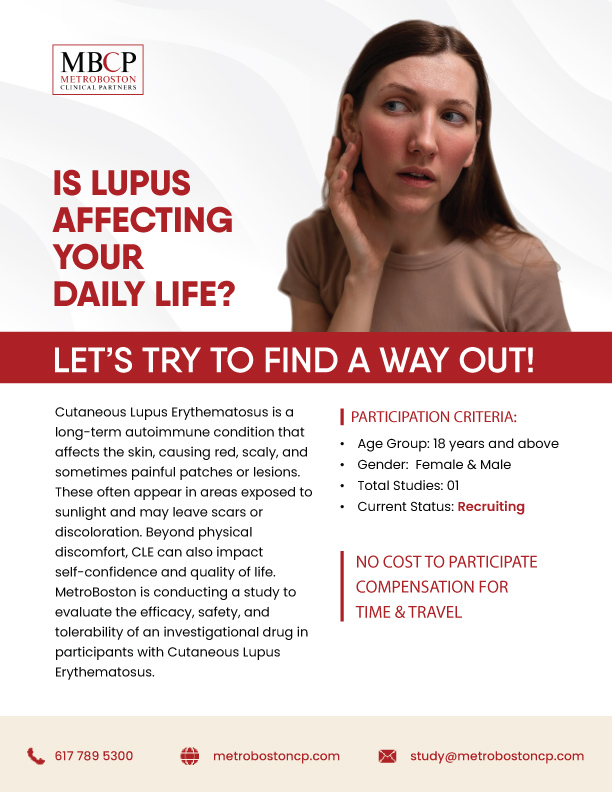
Lupus
CLE is an autoimmune condition where the body’s immune system mistakenly attacks healthy skin, causing inflamed, red, and scaly patches or lesions.
18 Years and older
Recruiting
Boston
All
01
Acne Vaccine
A clinical trial in Boston is evaluating an Acne mRNA vaccine to develop a safer, more effective acne treatment. Open to individuals aged 18 to 45, this research aims to help the body fight acne-causing bacteria. Participation is at no cost, with compensation for time and travel.
18 Years to 45 Years
Recruiting
Boston
All
01
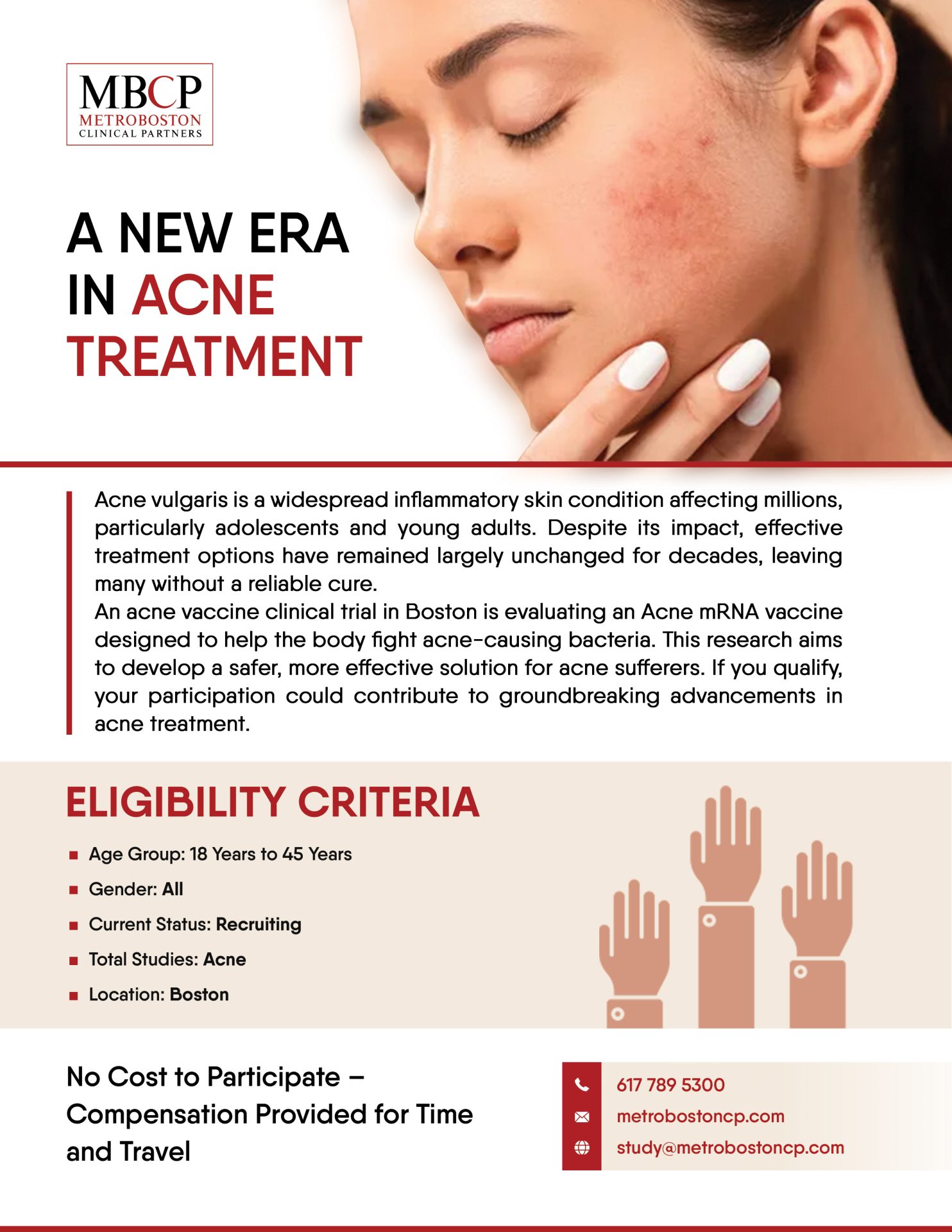
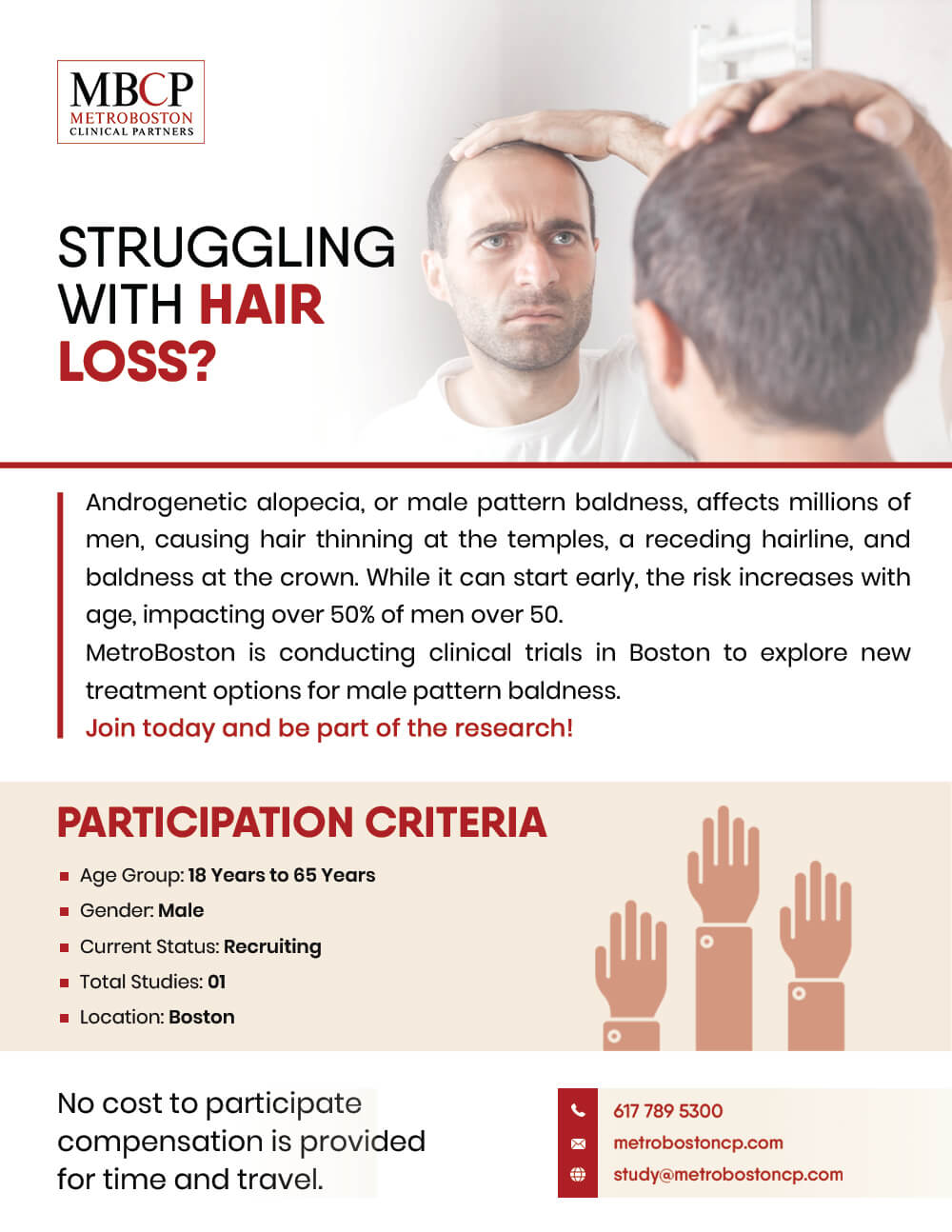
Androgenetic Alopecia
Male pattern hair loss, also called androgenetic alopecia (AGA), is a common condition that affects hair growth on the scalp. In men (male-pattern hair loss or MPHL), it usually starts with a receding hairline, thinning at the crown, or both. This condition happens due to a mix of genetic factors and male hormones.
Androgenetic alopecia affects about 50 million men and 30 million women in the U.S. It can begin as early as the teenage years, with the risk increasing with age. Over 50% of men over 50 experience some hair loss, while women are more likely to notice hair thinning after menopause. MBCP is currently conducting a study on androgenetic alopecia to explore potential treatment options.
18 Years to 65 Years
Recruiting
Boston
Male
01
Pediatric vitiligo
Pediatric vitiligo is a condition in which children develop white patches on their skin caused by the loss of pigment-producing cells called melanocytes. MetroBoston is conducting a clinical trial for pediatric vitiligo, offering families the chance to access advanced treatments and support vital research. The study is open to children aged 2 to 12 years, with no cost to participate and compensation provided for time and travel expenses. Join us in advancing care for pediatric vitiligo.
2 to 12 years & Above
Active
Boston
Male and Female
01
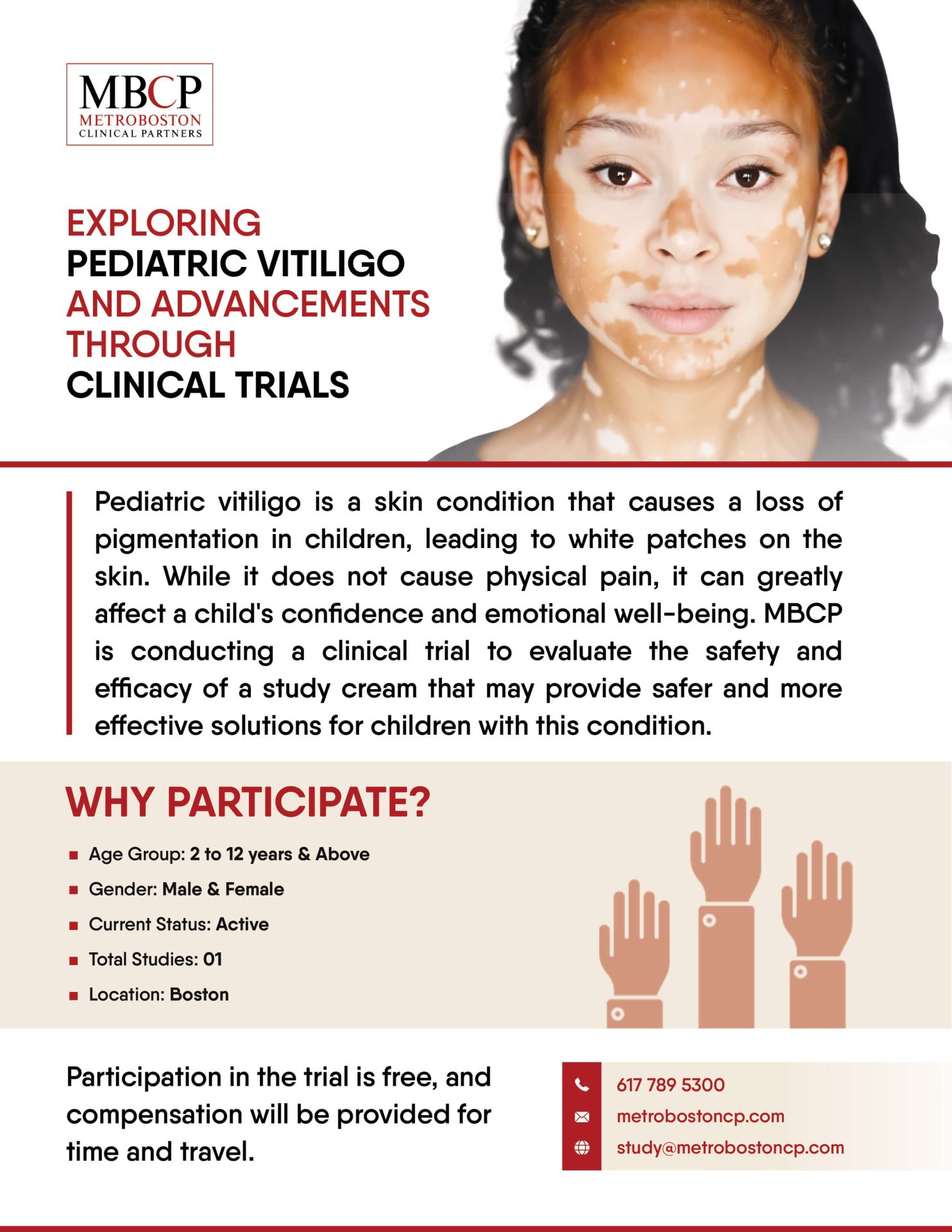
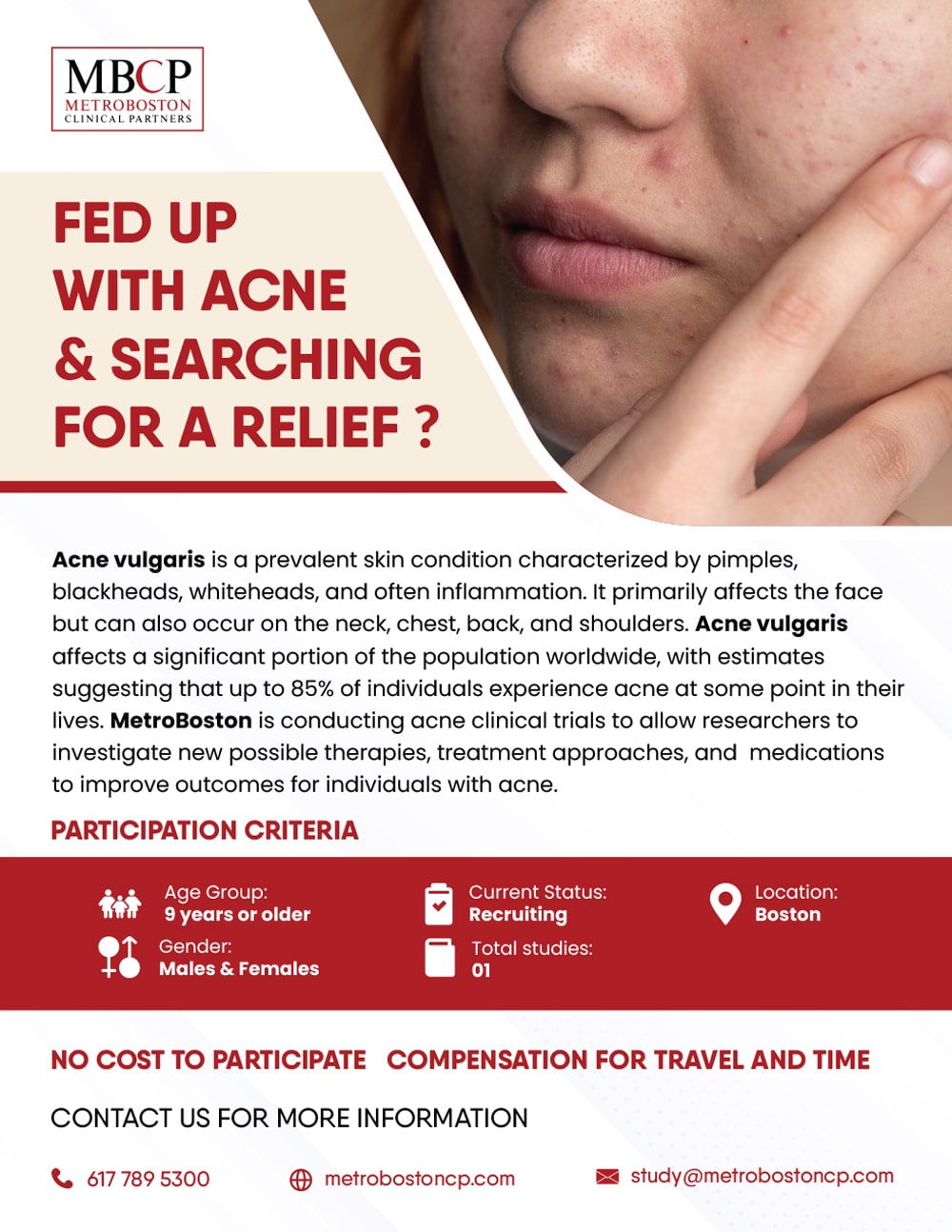
Acne
Acne is a common skin condition that occurs when hair follicles or open pores become clogged with oil and dead skin cells. This can lead to the formation of pimples, whiteheads, blackheads, and cysts, typically on the face, back, chest, and shoulders. Acne can be caused by hormonal changes, bacteria, or genetics, making it one of the most prevalent skin conditions in the United States, affecting up to 85% of teenagers and up to 25% of women and 12% of men in their 40s—acne clinical trials in Boston investigate safety and effectiveness of potential treatment for acne.
9 years and above
Recruiting
Boston
Male and Female
01
Warts
Warts are common skin growths caused by the human papillomavirus (HPV) infection. They typically appear as small, rough bumps on the skin and can develop on any part of the body, including the hands, feet, face, and genital area. Warts are contagious and can spread through direct contact with the virus or by touching surfaces or objects that have been in contact with the virus. While warts are usually harmless and may disappear on their own over time, they can be bothersome or unsightly, leading individuals to seek treatment. We are conducting dermatology clinical trials to assess the efficacy and safety of potential new treatments that can improve Warts.
12 Years & Above
Recruiting
Boston
Male and Female
01
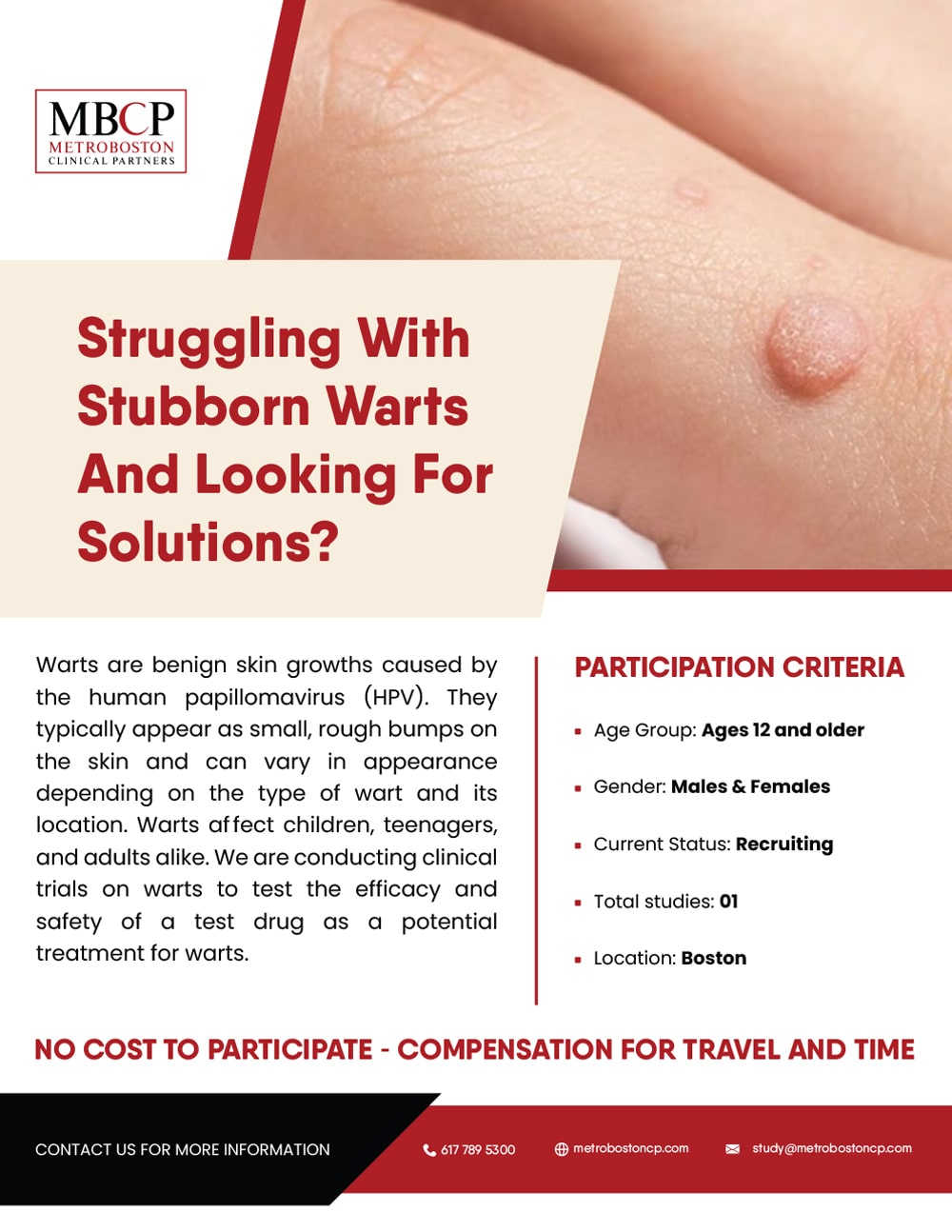

Atopic Dermatitis/Eczema
Pruritus, also known as itching, is a common symptom of eczema. Itching is often one of the first symptoms that people with eczema experience and can be one of the most distressing aspects of the condition. Pruritus affects 90% of adults who have Eczema. Some conventional treatments include moisturizers, topical corticosteroids, topical or oral immunomodulators, and allergen avoidance. Pruritis (itching) associated with eczema can be debilitating. We are conducting dermatology clinical trials to assess the efficacy and safety of potential new treatments that can improve Atopic dermatitis.
Adults
Recruiting
Brighton – Boston
Male and Female
04
Hidradenitis Suppurativa
Hidradenitis suppurativa (HS) is a skin disease that affects hair follicles in areas such as the armpits, groin, under breasts, and buttocks. HS causes recurrent painful nodules and abscesses, which lead to scarring and disfigurement. Hidradenitis suppurativa affects approximately 4% of the population globally, and while it is non-life threatening HS can lead to skin infections and other severe illnesses, and rarely squamous cell cancer. MetroBoston is conducting dermatology clinical trials in Boston to determine the safety and efficacy of new potential treatments.
18 years and above
Recruiting
Brighton – Boston
Male and Female
01


Vitiligo
Vitiligo causes white patches or depigmentation of the skin; it is the most common form of vitiligo. It affects around 0.5% – 2% of the population globally. Vitiligo can occur at any age and affects people of all races and ethnicities. Currently limited treatment options include topical steroids, vitamin D3, calcineurin inhibitors, topical immunomodulators, phototherapy, surgical treatments, and camouflage. MetroBoston is conducting clinical research in dermatology to determine the safety and efficacy of new potential treatments that may improve skin pigmentation. So, if you live in Boston, enroll in our Dermatology Clinical Trials in Boston now.
10-19 years & above
Recruiting
Brighton – Boston
Male and Female
01
Psoriasis
Psoriasis is a common chronic autoimmune skin disorder that presents as raised, red patches of skin covered with silvery-white scales, often accompanied by itching and discomfort. It is the most prevalent form of psoriasis, affecting millions of individuals worldwide. Plaque psoriasis is caused by an overactive immune system that prompts the rapid turnover of skin cells, leading to the characteristic thickened plaques. These plaques can appear anywhere on the body but are commonly found on the elbows, knees, scalp, and lower back. Plaque psoriasis is associated with a range of physical and emotional challenges, including pain, self-esteem issues, and a potential increased risk of other health conditions. We are conducting dermatology clinical trials to assess the efficacy and safety of potential new treatments that can improve Plaque Psoriasis.
18 years and older
Recruiting
Brighton – Boston
Male and Female
02
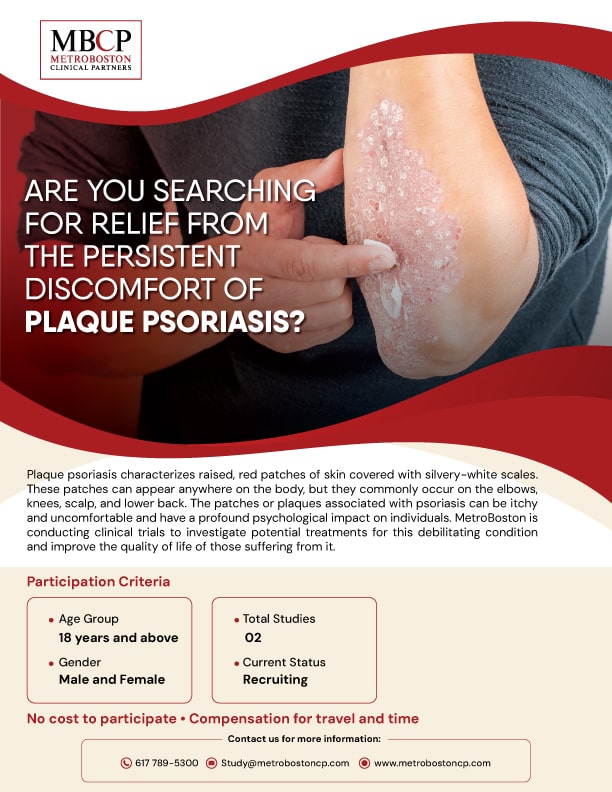
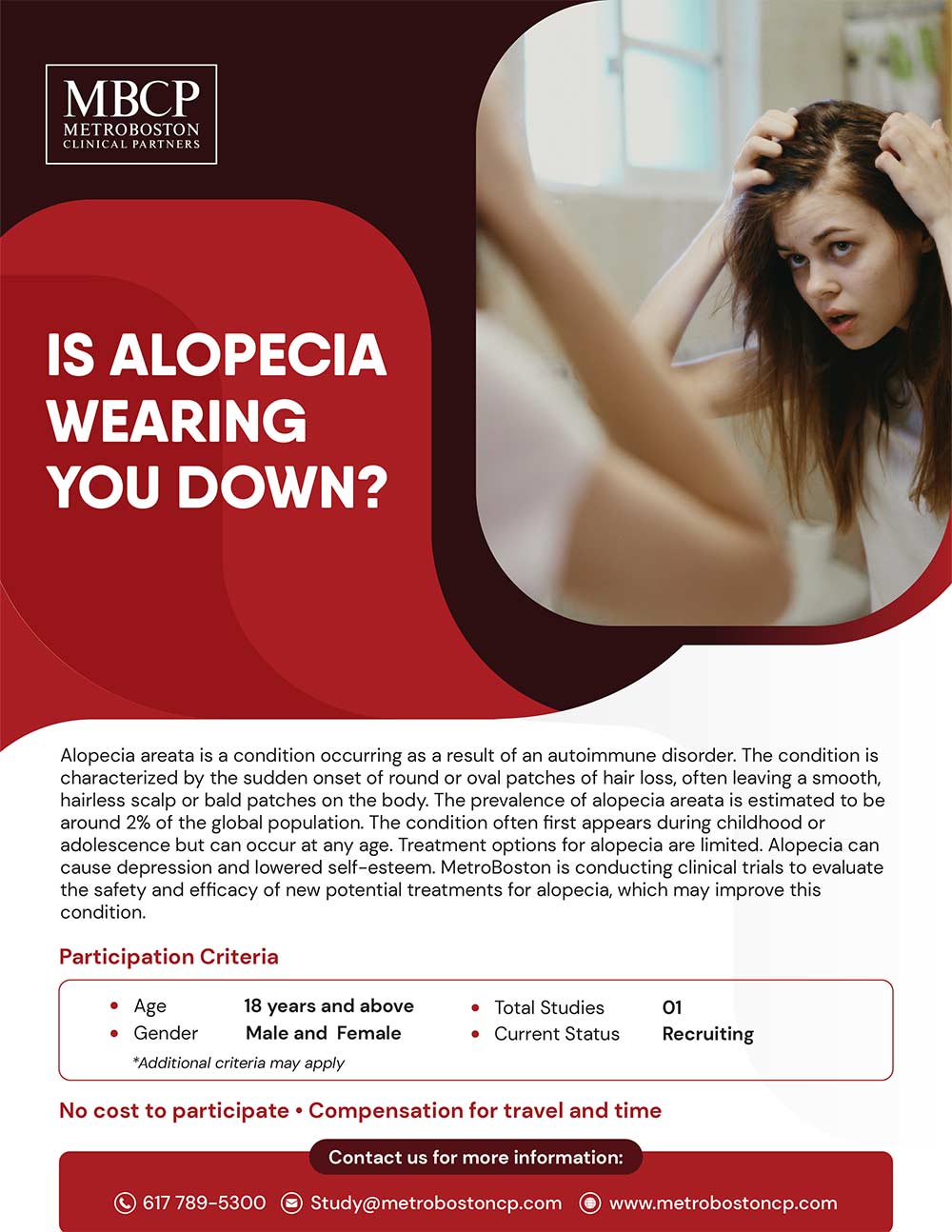
Alopecia Areata
Alopecia areata is a condition occurring as a result of an autoimmune disorder. The condition is characterized by the sudden onset of round or oval patches of hair loss, often leaving a smooth, hairless scalp or bald patches on the body. The prevalence of alopecia areata is estimated to be around 2% of the global population. The condition often first appears during childhood or adolescence but can occur at any age. Treatment options for alopecia are limited. Alopecia can cause depression and lowered self-esteem. MetroBoston is conducting clinical research in dermatology to evaluate the safety and efficacy of new potential treatments for alopecia, which may improve this condition. So enroll in our dermatology clinical trials now.
18 years and above
Recruiting
Brighton – Boston
Male and Female
01
Frequently Asked Questions
What is dermatology?
Dermatology is a branch of medicine that focuses on diagnosing, treating, and managing skin, hair, and nail conditions. Dermatology Clinical Trials include treatment for diseases related to skin, hair, and nails.
What does a dermatologist do?
Dermatologists are medical doctors with a specialization in dermatology. They have expertise in diagnosing and treating both common and rare skin conditions.
What are the 4 types of dermatology?
There are several subspecialties within the field of dermatology, each focusing on specific areas or conditions. Here are four common types of dermatology subspecialties:
Medical Dermatology.
Surgical Dermatology.
Cosmetic Dermatology.
Pediatric Dermatology.
What are the most common things dermatologists treat?
Some of the most common conditions that dermatologists treat include:
Acne
Eczema
Psoriasis
Skin Cancer
Dermatitis
Hair and Scalp Conditions
Nail Disorders
Rosacea
Dermatology studies also help in identifying symptoms and developing a treatment plan.